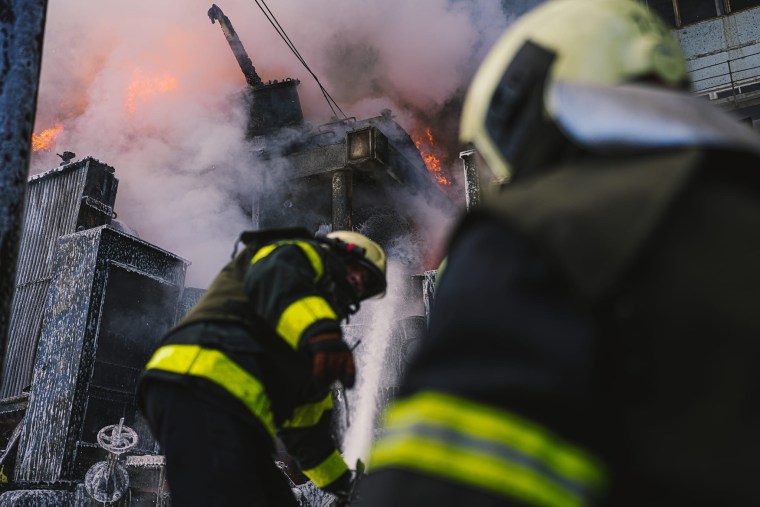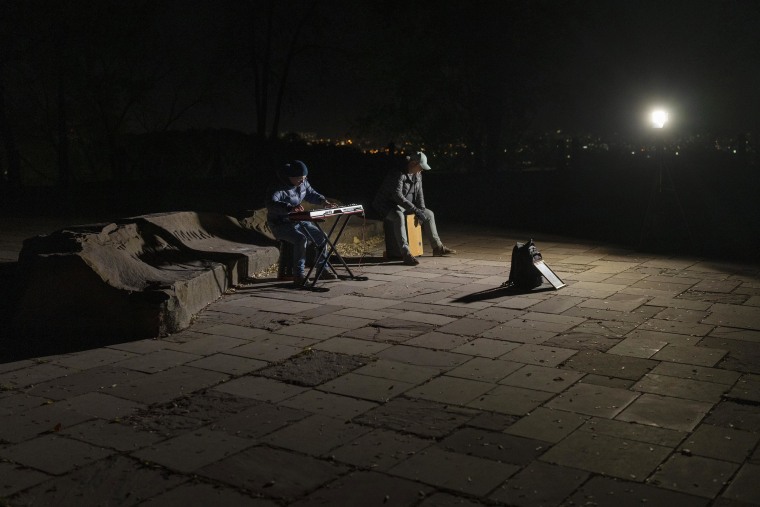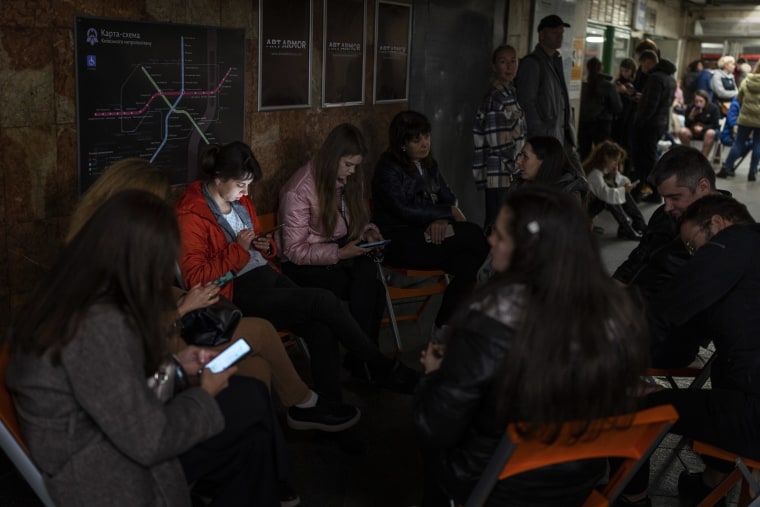KYIV, Ukraine — Ukraine faced widespread power outages Thursday as the country’s energy system struggled to cope with the damage from a wave of Russian attacks.
Civilians across the country were warned to brace for planned power cuts of up to four hours at a time as Ukraine’s national energy company, Ukrenergo, urged people to charge all their devices and stock up on warm socks, blankets and flashlights.
Russian President Vladimir Putin’s forces have launched intensified missile strikes and “kamikaze” drone attacks against critical infrastructure, in what Ukrainian officials and Western military analysts say is a deliberate new strategy by the Kremlin ahead of winter.
From Kharkiv in the east to Lviv in the west, Russian attacks have damaged or destroyed facilities across the country that have supplied power, heat and water throughout the war. Officials pleaded with people to conserve electricity as crews tried to keep up with the repairs.

In just over a week, Moscow’s military took out as much as 30% of the country’s power stations, President Volodymyr Zelenskyy said. Kyiv has accused Russia of seeking to annihilate the country’s energy system as colder weather sets in because the Kremlin’s military is facing a litany of setbacks on the battlefield.
“We assume that Russian terror will be directed at energy facilities until, with the help of partners, we ensure the ability to shoot down 100% of enemy missiles and drones,” Zelenskyy said in a video address Wednesday.
Ukraine’s energy minister, Herman Halushchenko, said Thursday the government was seeking a 20% reduction in energy use and that Ukrainians had responded to the appeal to ease pressure on the country’s grid.
‘Anger more than fear’
People in the country’s capital, Kyiv, told NBC News they had been preparing for shortages by stocking up on candles, portable chargers, diesel generators, gas stoves and even thermal underwear and electric blankets.
Iryna Veremenko, who lives in an apartment in Kyiv, said she prepared for the possible blackouts on Thursday by charging all her devices the night before and setting aside food that’s easy to reheat.
Veremenko, 38, said she turned off all her appliances and was relying on her apartment’s gas supply to cook or heat water if necessary.
“I feel anger more than fear,” Veremenko said, adding that the strikes on Ukraine’s energy systems show Moscow’s desperation, which she said is all the more reason for Ukraine to resist.
The business analyst said she had been preparing for temporary shutdowns by stocking up on canned foods, keeping her portable charger ready at all times, and having a travel-size gas burner on the ready. She also has a sleeping bag designed for below freezing temperatures, a thermal blanket and even skiing clothes in case temperatures continue dropping and the strikes on energy targets continue.

The mercury in the Ukrainian capital over the next week are unlikely to rise above 50 degrees Fahrenheit, current forecasts show.
Yuriy Kamelchuk, a Ukrainian lawmaker and member of the parliamentary energy committee, told NBC News that Ukrainians were adapting and even if the power outages become regular, “we know what we are enduring it for.”
“This is all for the sake of true independence and freedom from a crazy neighbor,” Kamelchuk said.
Yana Balatsko, who lives with her husband and three dogs in a private house in the city of Chernivtsi in western Ukraine, said by phone Thursday that she was also heeding the government warnings and had minimized the use of all electronics and appliances.
Should the blackouts continue, Balatsko, 34, said they have a diesel generator and a supply of wood to keep the house warm. They also still have candles and power banks that they stocked up on in the earlier days of the war, she said.
While feeling prepared, Balatsko, who works in IT, said the situation was taking a toll.
“I feel depressed one day and ready to fight the next day,” Balatsko said. “I am angry, I am fed up with the war, but we should stand to the end. … We will win, I have no doubt. Current restrictions are worth it.”
For months, the Kremlin said it was only after military targets — not civilian or critical infrastructure in Ukraine. But since the attack on a key bridge in the annexed Crimean Peninsula dealt Putin a strategic and symbolic blow, the Russian Defense Ministry has been open about striking energy targets within Ukraine.
Reports on the damage and the consequent blackouts affecting regular Ukrainians have figured prominently in state media news broadcasts.
A ‘very dangerous strategy’
Western and Ukrainian analysts say it signals the Kremlin’s new approach, demoralizing both Ukraine and its allies by attempting to fuel a humanitarian crisis.
“This is a new strategy, and a very dangerous one,” Volodymyr Fesenko, a Kyiv-based political analyst and the head of the Ukrainian think tank Penta, told NBC News.
It’s aimed primarily at “demoralizing” the Ukrainian public, Fesenko said, but also weaking Ukraine’s overall defense capability and the resolve of Ukraine’s Western partners — betting that people faced with long-term energy outages will flee their towns and villages in a new wave of mass migration on a continent already strained by its own energy crisis stoked by the conflict.
The British Defense Ministry also said in an assessment this week that causing widespread damage to Ukraine’s energy network is likely the “key objective” of the Kremlin’s strike campaign.
“As Russia has suffered battlefield setbacks since August, it has highly likely gained a greater willingness to strike civilian infrastructure in addition to Ukrainian military targets,” the ministry said in its analysis.
Fesenko said it’s clear the majority of Ukrainians have responded with resilience and patience, adapting to rolling blackouts and preparing for a difficult winter ahead.
“This only increases the hatred for Putin and the Russian invaders,” Fesenko said, adding that while the shortages may not break Ukrainians’ fighting spirit, they could increase some people’s openness to a peace deal, even a bad one — something Ukrainian officials said they are not considering right now.
“The winter will show how people really feel,” he said. The Kremlin is making sure it’s a cold and dark one.

